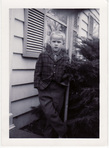Eric Hanson's Blog, page 9
October 2, 2009
Career Tracks
Wallace Stevens was born on this day in 1879, in Reading, Pennsylvania. He always wanted to be a writer but then he studied law, as his father urged him to do, and spent his whole working life in the insurance business, eventually becoming an executive for the Hartford. Which is the story of everybody's life. Most of the novelists you read pay their mortgages by teaching. Poets write advertising copy. T. S. Eliot was an editor. Edgar Lee Masters wrote poems while sitting in a courtroom where ...
Published on October 02, 2009 07:56
September 29, 2009
Live Fast, Die Young
On September 30, 1955, James Dean died in a head on collision while driving his Porsche Spyder to a race in Salinas, California. He was 24. He'd starred in three films, all made within the previous year, East Of Eden, Rebel Without A Cause, and Giant, for which he received two Oscar nominations. James Dean appears four times in A Book of Ages.
Published on September 29, 2009 22:06
Irony and Safire
William Safire, who died the other day, was a master of ironic commentary. Every Sunday I was impressed at the way he was able to turn his column about language and words into a forum on the shortcomings of liberals. So it was a pleasure to include him in my book, winning a Pulitzer Prize in 1978, at age 48, for exposing the corruption in the Carter administration. Few knew corruption as intimately as Safire––he'd worked in the Nixon White House. The entry following the one about Safire is ab...
Published on September 29, 2009 06:49
September 28, 2009
Louis Armstrong speaks his mind
In September 1957 Louis Armstrong broke his long silence on the race issue in an interview to a young reporter for the Grand Forks Herald in North Dakota. He was 56. It came as a shock to most Americans who were used to the trumpeter's ingratiating smile and comic manner, but he was angry, and had been angry for a long time. The interview came two weeks after black schoolchildren were barred from schools in Little Rock by National Guardsmen. Almost a century since Emancipation, Armstrong w...
Published on September 28, 2009 22:36
September 27, 2009
Tom and Viv
In September 1932, T. S. Eliot moved out of the London apartment he shared with his wife, Vivien. The poet was 43. They'd been married for almost twenty years, but her mental illness had made her increasingly difficult to live with. She had begun biting visitors.
Published on September 27, 2009 22:32
September 26, 2009
Picking Winners
In September 1945, German scientist Wernher von Braun, architect of the V-2 rocket program which had been blowing large holes in London, surrendered to the Americans instead of the Soviets. Which is why people on the moon speak English today instead of Russian. Mr. von Braun appears four times in A Book of Ages.
Published on September 26, 2009 22:28
September 24, 2009
Epiphanies
One evening in September 1931, C. S. Lewis had one of those late night discussions about Christianity with his usual Oxford chums J. R. R. Tolkien and Hugo Dyson. The next day he had an epiphany on his way to the zoo. He was on the back of his brother's motorcycle. Lewis later tells how when he started off for the zoo "I did not believe that Jesus Christ was the Son of God, and when we reached the zoo I did." Lewis was 32 and had always been a skeptic.
Life is full of journeys, long and shor...
Life is full of journeys, long and shor...
Published on September 24, 2009 22:53
September 23, 2009
A Wild and Crazy Guy
On September 24, 1977 Steve Martin told a live network television audience that he was a "wild and crazy guy." He may have been wearing an arrow through his head. He was 32. Steve Martin appears [ :] times in A Book of Ages.
Published on September 23, 2009 22:10
September 22, 2009
Martha Stewart
In September 1965, Martha Stewart quit her modeling career after the birth of her daughter Alexis. She was 24. She would eventually find other work. The homemaking doyenne appears five times in A Book of Ages.
Published on September 22, 2009 22:09
September 21, 2009
Keats
In one year, between September 1818 and September 1819, John Keats wrote most of the poems that would ensure his immortality, including "Ode on a Grecian Urn," "Ode to a Nightingale" and "To Autumn." He was 23 years-old and would live another two years. Keats appears twice in A Book of Ages.
Published on September 21, 2009 22:01



